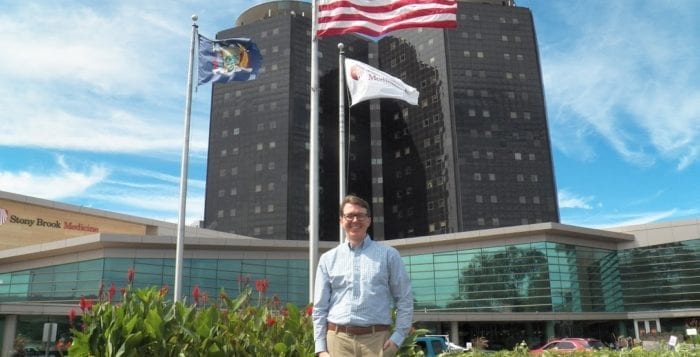By Daniel Dunaief
It may take a village and then some to conquer pancreatic cancer, which is pretty close to what The Cancer Genome Atlas project assembled.
Pulling together over 200 researchers from facilities across the United States, the TCGA recently published an article in the journal Cancer Cell in which the scientists explored genetic, proteomic and clinical information from 150 pancreatic cancer patients.
Richard Moffitt, an assistant professor in the Departments of Biomedical Informatics and Pathology at Stony Brook University who joined the institution at the end of July, was the analysis coordinator for this extensive effort.
The results of this research, which worked with pancreatic ductal adenocarcinoma, the most common form of this cancer, offered a look at specific genetic changes involved in pancreatic cancer, which is the third leading cause of death from cancer.
“The study has several immediate clinical implications for patients facing the diagnosis of pancreatic cancer,” Ralph Hruban, one of the corresponding authors on the article and the director of the Sol Goldman Pancreatic Cancer Research Center at Johns Hopkins University School of Medicine, wrote in an email.
The work “provides hope for future clinical trials in that 42 percent of patients within this cohort had cancers with at least one genetic alteration that could potentially be therapeutically targetable, and 25 percent of the patients had cancers with two or more such events.”
These genetic findings suggest a potential basis for genetic change-driven therapy trials down the road, Hruban suggested. As the analysis coordinator, Moffitt “played a critical role” Hruban continued. “He brought hard work, amazing creativity and great scientific knowledge to the project.”
Moffitt joined this effort about four years ago, after the collaboration began. The assistant professor said he pulled together the various data sets and analysis results from different teams and helped turn that into a “coherent overall story.”
Moffitt was also in charge of the messenger RNA analysis. He had been at the University of North Carolina as a postdoctoral researcher in Vice Chair of Research Jen Jen Yeh’s lab for the last five years until his recent move to Stony Brook.
Benjamin Raphael, another corresponding author on the article and a professor in the Department of Computer Science at Princeton University, suggested Moffitt played a critical part in the recent work. “In any large-scale collaboration such as this one, there tend to be a smaller number of researchers who play an outsized role in the project,” Raphael explained in an email. Moffitt “played such an outsized role. Without his dedication to the project over the past few years, it is doubtful that our analysis” would have been as comprehensive.
Members of TCGA contacted Moffitt and Yeh because the tandem were working on a new approach to studying gene expression that would eventually be published in a 2015 Nature Genetics article.
Working with Yeh, Moffitt helped tease apart the genetic signature of pancreatic cancer cells from the different types of cells around it, which also includes healthy cells and a cluster of dense cells around the tumor called the stroma.
“The proportion of cancer cells in pancreatic cancer is low so if you imagine a mix of marbles of the same color on the outside but different on the inside and only having 10 in a bag of 100, figuring out what 10 [are] ‘tumor’ colors on the inside was very challenging,” Yeh explained in an email.
The TCGA study explains subtypes of cancer Moffitt didn’t know existed just a few years ago, while exploring the possible role that micro RNA and DNA methylation — the process of adding or taking away a methyl group from a genetic sequence to turn on and off genes — has in describing those subtypes.
Researchers “need projects like TCGA that are a really well-controlled way to study almost every molecule you want to study systematically for 150 cases to reveal these networks,” Moffitt said.
Moffitt has coupled his appreciation for algorithms and math with an interest in biology and engineering. His Ph.D. was done in a dry lab, which didn’t even have a sink. When he moved to UNC to conduct his postdoctoral work, he took a different approach and worked with surgical oncologists on tissue samples.
Moffitt plans to continue working with TCGA data and also to see how the subtypes can be used to predict responses to therapies. Some time in the future, researchers hope patients can get a diagnostic biopsy that will direct them to the specific therapy they receive, he said.
Moffitt grew up in Florida and earned his bachelor’s and doctoral degrees at Georgia Tech before completing his postdoctoral research at UNC. He has been gradually drifting north. Moffitt and his wife Andrea, who just started her postdoctoral work with Michael Wigler and Dan Levy at Cold Spring Harbor Laboratory, live in Stony Brook.

The water on Long Island is colder than it is in Florida, where Moffitt spent considerable time on a show skiing team. This was his version of a varsity sport, where he spent about six hours a day on Saturday and Sunday during the spring and about three hours a night before tournaments performing moving pyramids, among other tricks. When he was in high school, Moffitt wrote a computer program that automates the show skiing scoring process.
Moffitt processes the world through probabilities, which figured into the way he chose stocks in high school as a part of a stock picking competition and the way he approached his picks for March Madness. His basketball bracket won a competition for bragging rights among about a dozen entrants in 2016 and he was one game away from repeating in 2017 until UNC beat Gonzaga.
As for his Stony Brook effort, Moffitt plans to collaborate with members of the Cancer Center as well. “Being in demand is a good thing.”





